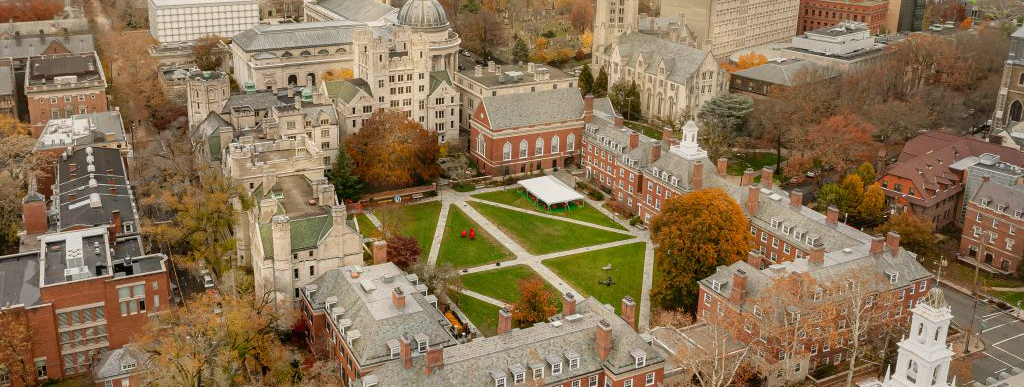IvyWise On-Demand: Yale University: How to Get in and What to Know
Are you considering applying to Yale University? Whether you are beginning the college search process or finalizing your list, this is a great opportunity to learn all about the university and hear expert tips on how to get in from IvyWise college admissions counselors Christine and Scott, both former assistant directors of admissions at Yale University.
Watch Now
As a member of the Ivy League that’s known for its top-notch music and arts programs, it’s easy to understand why many rank Yale at the top of their college list. The university, one of the oldest in the country, offers many strong areas of study and is within traveling distance of New York City.
Since Yale University has a stellar reputation and receives thousands of applicants each year, students must go the extra mile to get a spot. Read on to learn more about what sets Yale University apart and learn best practices to increase your chances of admission.
How to Get into Yale University: Table of Contents
- When to Apply to Yale University
- How Hard Is It to Get into Yale: Early Prep
- How Do You Actually Get into Yale: The Application
- Class Profile
- What Makes Yale University Unique?
- Yale University FAQs
When to Apply to Yale University
The first step to any application process should be reviewing the application timeline. Students should make sure they’re prepared to meet every admissions milestone. Like most top-tier colleges in the United States, Yale University uses a holistic admissions process that includes both quantitative and qualitative factors demonstrated through different materials with specific timelines. Here is an overview of the Yale University admissions process and the dates that prospective applicants need to keep in mind:
Yale Application Deadlines
Yale’s application deadlines vary slightly from year to year, but generally occur around the same time during the academic calendar. For students applying during the 2024-25 admissions cycle, the major application deadlines are as follows:
- November 1: Single Choice Early Action (SCEA) applications
- November 1: Single Choice Early Action financial aid applications
- January 2: Regular Decision applications
- February 15: Regular Decision financial aid applications
SCEA applicants can expect a decision in mid-December, while Regular Decision notifications are released by April 1.
Early, Rolling, and Regular Decision
While much of the application process will look similar regardless of the timeline, it’s important to understand the distinct differences between early, rolling, and regular admissions.
There are two different forms of early admissions: Early Action and Early Decision. The key differentiator between the two is that Early Decision is binding, meaning that if you are admitted to a college via an Early Decision application, you must enroll in that college. Early Action, meanwhile, is not binding. Yale University offers Single Choice Early Action, which stipulates that students cannot apply to any other college through an early admissions program, with a few exceptions, such as non-binding applications to public colleges. Early Decision and Early Action deadlines are generally around the beginning of November with decisions released approximately one month later — early applicants to Yale can expect a decision in mid-December.
Regular Decision is the most common admission option. It is non-binding, meaning that students do not have to commit to enrolling if they are admitted. Applicants who opt for the Regular Decision round at Yale will receive a decision by April 1. Students admitted to Yale in either the early or regular rounds have until May 1 to respond to their admission offer.
In contrast to early and regular admissions, rolling admissions do not follow a strict deadline. At most schools that offer this option, applications are accepted any time from September through May. That said, it is best for students to submit their applications as early as possible, since RA schools will continue to accept students until they reach their enrollment capacity. Yale University does not offer rolling admissions.
Waitlisted Applications
If you apply Regular Decision to Yale, you can expect one of three decisions: accepted, waitlisted, or denied. If you are waitlisted, it means that you are an exceptionally strong applicant, but the college just doesn’t have enough room to admit you. You can choose whether to remain on the waitlist but consider doing so only if Yale is your top choice. The chances of being admitted off the waitlist are slim — of the 773 students waitlisted at Yale for the class of 2028, only 23 were admitted.
Deferrals
Three decisions also exist for Single Choice Early Action applicants: accepted, deferred, or denied. A deferral means that your application will be reviewed in the Regular Decision round. Students are often at a loss for what to do if they have been deferred. Often, the college needs more information from you, such as an updated transcript. Check with Yale admissions to clarify what information they need so you can send it out as soon as possible.
How Hard Is It to Get into Yale: Early Prep
Yale University is one of the most prestigious institutions in the country. Every year, thousands of applicants apply — as these admission rates demonstrate, only a small percentage of them are offered a seat in the class:
- Class of 2026: 4.57%
- Class of 2027: 4.50%
- Class of 2028: 3.87%
- Class of 2029: 4.60%
While Yale’s application process is notoriously competitive, you can increase your chances of admission by becoming an expert on the school and preparing for admission well in advance.
Build Your Profile
So, what does Yale look for in their students? As you might expect, academics carry the most weight. Yale’s admissions officers seek intellectually curious students who demonstrate an ongoing commitment to challenging themselves and becoming leaders.
The university also gains valuable insight through a student’s letters of recommendation. Your high school teachers can provide extremely helpful information in their evaluations. Not only do they discuss your performance in class, but they often write about characteristics like your intellectual curiosity, energy, relationship with classmates, and impact on the classroom environment.
Throughout your application, you should also highlight what you are passionate about, what you’ve done to pursue these passions throughout high school, and how attending Yale University will help you take these pursuits to the next level. You can discuss both academic interests as well as extracurricular activities that are meaningful to you. Rather than list as many activities as possible to stand out, it’s best to focus on a handful of interests that you’re especially invested in.
Visit the Campus
If you’re eager to attend Yale University, visiting the campus is one of the best things you can do to demonstrate your interest. Register for a student-led campus tour to get a feel for the university. STEM tours are offered for students interested in pursuing science or engineering. If you can’t make it to campus, Yale offers virtual events, including tours, information sessions, and student forums.
Connect With a Student
In addition to touring the campus, it can be helpful to get a current student’s perspective on their experience at Yale University. Your student tour guide is a great resource, but you can also connect with current students through virtual events hosted by the admissions office. Register for a student forum to participate in a live Q&A with current students. Yale also offers regional virtual sessions and current student conversations so you can learn more about the experiences of students from different regions of the U.S.
How Do You Actually Get into Yale: The Application
There’s no magic trick or tried-and-true strategy that you can use to guarantee your admission to Yale University. That said, you can take steps to increase your odds of admission and set yourself apart for all the right reasons.
GPA Requirements
Yale University does not specify a GPA that you must meet for admission. However, since your academic record is the most important part of your application, it is safe to say that you need a strong GPA. While Yale does not report the high school GPAs of their enrolled students, they do report class rank. Out of students from the class of 2028 who reported class rank, 96% graduated in the top 10% of their high school class.
SAT and ACT Scores
Yale requires standardized test scores for admission, which can include AP or IB scores in lieu of the SAT or ACT. It is helpful to know the score range of accepted students, so you can set your goal score. For the ACT, the score range for the middle 50% of students was 33-35. For a Yale-worthy test score, begin test prep many months ahead of your testing date and take several practice exams. Yale superscores the SAT and ACT, calculating your strongest section scores among multiple testing dates to create a new composite score.
Personal Statement
The personal statement is an opportunity to demonstrate not only your writing skills but also who you are and the qualities that set you apart. You can choose from seven Common App essay prompts. Instead of worrying about what you “should” sound like, it’s best to focus on letting your authentic voice and unique personality shine through.
Essays
In addition to the Common App personal statement, you must write several Yale supplemental essays so the admissions committee can learn more about your interests and the role you would play on campus. The questions for the 2025-26 admissions cycle include several short answer prompts as well as an essay.
Applicants submitting the Coalition Application, Common Application, or QuestBridge Application will respond to the following short answer questions:
- Students at Yale have time to explore their academic interests before committing to one or more major fields of study. Many students either modify their original academic direction or change their minds entirely. As of this moment, what academic areas seem to fit your interests or goals most comfortably? Please indicate up to three from the list provided.
- Tell us about a topic or idea that excites you and is related to one or more academic areas you selected above. Why are you drawn to it? (200 words or fewer)
- Reflect on how your interests, values, and/or experiences have drawn you to Yale. (125 words or fewer)
Applicants submitting the Coalition Application or Common Application will also respond to the following short answer questions, in no more than 200 characters (approximately 35 words):
- What inspires you?
- If you could teach any college course, write a book, or create an original piece of art of any kind, what would it be?
- Other than a family member, who is someone who has had a significant influence on you? What has been the impact of their influence?
- What is something about you that is not included anywhere else in your application?
Applicants submitting the Coalition Application or Common Application will respond to one of the following prompts in 400 words or fewer.
1. Reflect on a time you discussed an issue important to you with someone holding an opposing view. Why did you find the experience meaningful?
2. Reflect on your membership in a community to which you feel connected. Why is this community meaningful to you? You may define community however you like.
3. Reflect on an element of your personal experience that you feel will enrich your college. How has it shaped you?
Letters of Recommendation
Yale University requests two letters of recommendation from teachers and a recommendation from a high school guidance counselor. Yale University recommends that letters of recommendation come from teachers who have worked with you during your junior or senior year of high school and can speak to your academic performance and character. Since most teachers and counselors will get an influx of requests for letters of recommendation, aim to ask instructors by the end of junior year so they have plenty of time to compile their responses.
Admissions Interviews
Admissions interviews are conducted either by members of the Yale Alumni Schools Committee in your local area or virtually by a current senior. While these interviews are evaluative, not all students receive invitations to interview — if you’re not offered an interview, you are not at any disadvantage in the admissions process. Students are invited to interview after submitting their application materials, and priority is given to applicants for whom more information is needed.
Contribution to the Yale Community
Like many colleges, Yale University admissions officers are eager to admit applicants who will make a lasting impact on the Yale community. Throughout every component of your application process, including supplemental essays, highlight your goals and the role you would hope to play once admitted to Yale. Don’t shy away from specific details — it’s best to name extracurricular interests, classes, and research opportunities that excite you. It’s particularly important that your Yale University application demonstrates a commitment to giving back and connecting with the community, as Yale students tend to have a tangible impact on shaping the campus experience.
Class Profile
As you’re doing research, look at how many people apply to Yale University in addition to how many were accepted — you can find this information in the class profile or Common Data Set. This information gives you a window into what the admissions outcomes look like.
What Makes Yale University Unique?
There are plenty of factors that make Yale University unique. Most notably, Yale University is known for its top-notch academic offerings in a wide array of fields and disciplines. Yale’s faculty is composed of world-renowned experts in every subject. Yale’s most popular majors include social sciences, biological and biomedical sciences, mathematics, and statistics, among others. Yale also offers several special departments and majors, including the Special Divisional Major, which is for academic study outside other major programs, and Multidisciplinary Academic Programs, a group of majors in interdisciplinary fields.
In addition to access to top-tier academics, students have no shortage of options when it comes to extracurricular activities on Yale’s campus. Some distinctive offerings include the Guild of Bookmakers, a club dedicated to teaching bookbinding, and the Yale Undergraduate Prison Project, which is a student social justice group centered around having dialogues about mass incarceration. The group provides tutoring and mentoring to prisoners and those recently released from prison. Yale is also home to the world’s oldest collegiate a cappella group, the Whiffenpoofs.
While Yale may be known for its academics over its athletics, the Yale Bulldogs have won 29 NCAA team championships, including 21 in men’s golf, 4 in men’s swimming, 2 in women’s fencing, 1 in men’s hockey, and 1 in men’s lacrosse. In addition to extracurriculars on campus, Yale has its own summer study abroad program — the Yale Summer Session Programs Abroad — in which Yale faculty lead programs in a variety of subjects around the world for Yale credit.
Yale boasts a host of famous alumni, including Hillary Clinton, Meryl Streep, Jodie Foster, Lupita Nyong’o, Paul Newman, Anderson Cooper, Claire Danes, James Franco, and Nathan Chen.
Yale University FAQs
What GPA do you need to get into Yale?
Yale does not require a specific GPA for admission, nor does it report the GPA of admitted students. However, you will need the strongest possible grades in the most rigorous courses available to you to be a competitive applicant.
How hard is it to get into Yale?
With an acceptance rate around 4% to 5%, Yale is one of the most difficult schools in the U.S. to get into.
What does it take to get into Yale?
Academic performance is the primary consideration for the Yale admissions committee; however, applicants are evaluated holistically. Your extracurricular interests, achievements, and contributions you have made to your community also matter.
Is Yale or Harvard harder to get into?
Both schools are extremely competitive and highly selective.
Admission Counseling
Most students and families can benefit from college admissions counseling, especially if they’re interested in gaining admission to a top-tier college like Yale University. Working with an admissions counselor gives you the chance to receive personalized guidance through every step of the application process, including compiling a balanced college list and brainstorming for your personal statement.
While working with a college admissions counselor is an invaluable experience, it’s important to assess whether you’re ready to give the admissions process your all. To make the most of college counseling, you must be engaged in the process and excited about your academic future. It’s also important to select a college admissions counselor who is accredited, qualified, and has ample admissions experience. Do plenty of research so you can pick an admissions counselor who brings out the best in the students they work with.
As one of the best universities in the world, Yale is tough to get into. IvyWise’s admissions counselors can provide years of expertise and know-how to help you be successful in the process. Take the first step toward getting into your dream school and schedule an Initial Consultation.
Get Started




